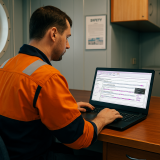Notice of Arrival/Departure (NOAD)
NEW NOAD WORKBOOK VERSIONS RELEASED 12TH JUNE 2018
NOAD WORKBOOK VERSION 7.5.1
and
OUTER CONTINENTAL SHELF (OCS) VERSION 1.5.1
Overview:
The United States Coast Guard (USCG) at Title 33 Part 160 of the U.S. Code of Federal Regulations
requires that ships arriving to and departing from a port (or OCS) in the United States file a NOA/D with
the NVMC. There are three methods available for filing NOA/D, which are:
1. Emailed submission of either of the latest two published NVMC Workbooks located at
www.nvmc.uscg.gov under the Downloads Tab and sent to enoad@nvmc.uscg.gov .
2. Via the NVMC eNOAD website.
3. Via Third-party application submissions conforming to standards found at www.nvmc.uscg.gov under the Developer Tab and sent to enoad@nvmc.uscg.gov. This option pertains to XML submissions made by means of third party software.
Current NOA/D Workbooks:
The current new versions of the workbook may be downloaded via the USCG’s NVMC website:
www.nvmc.uscg.gov where you can click the “Downloads” button followed by the “NOAD Workbook”
button on the left side of the page.
There are two new versions of Workbooks, as follows:
1. For ships arriving or departing US Ports: Version 7.5.1dated 12th June 2018
2. For ships operating in the US OCS – Oil and Gas Fields: Version 1.5.1 dated 12th June 2018
The official NVMC XLS workbook for submitting a Notice of Arrival/Departure (NOAD). This updated workbook contains corrections for port lists not populating when the country of Georgia is selected. It is requested that the worksheets/workbook are completed electronically and sent via email or imported into the eNOAD Web Application. Alteration of the official workbook will result in significant delays in processing.





